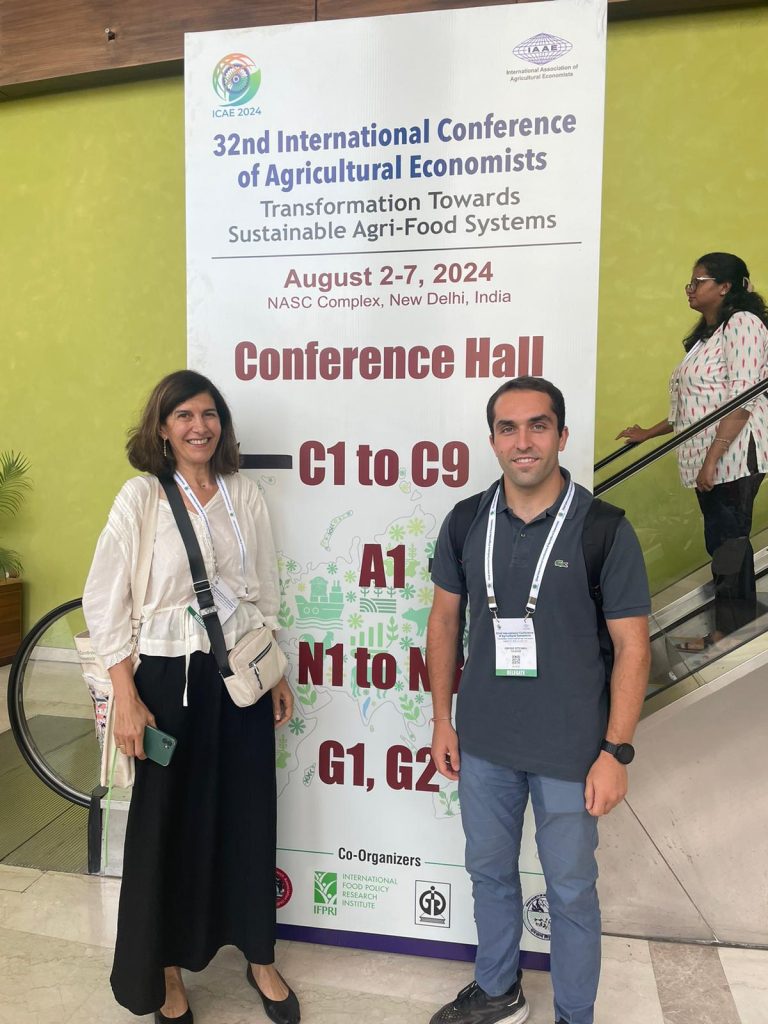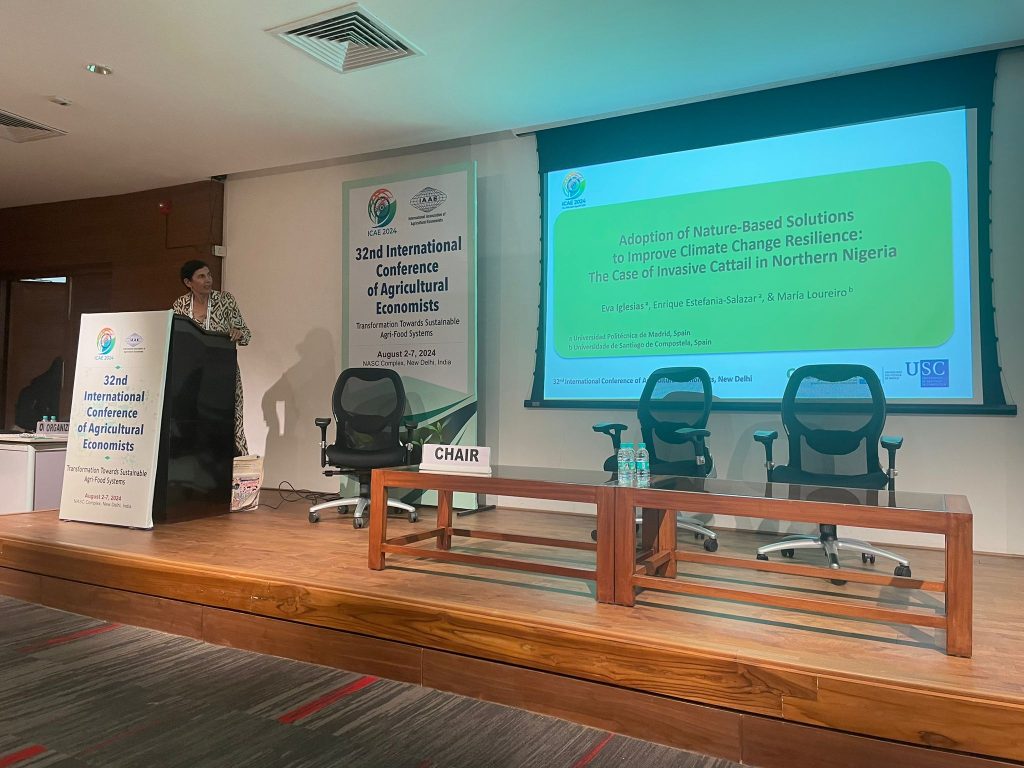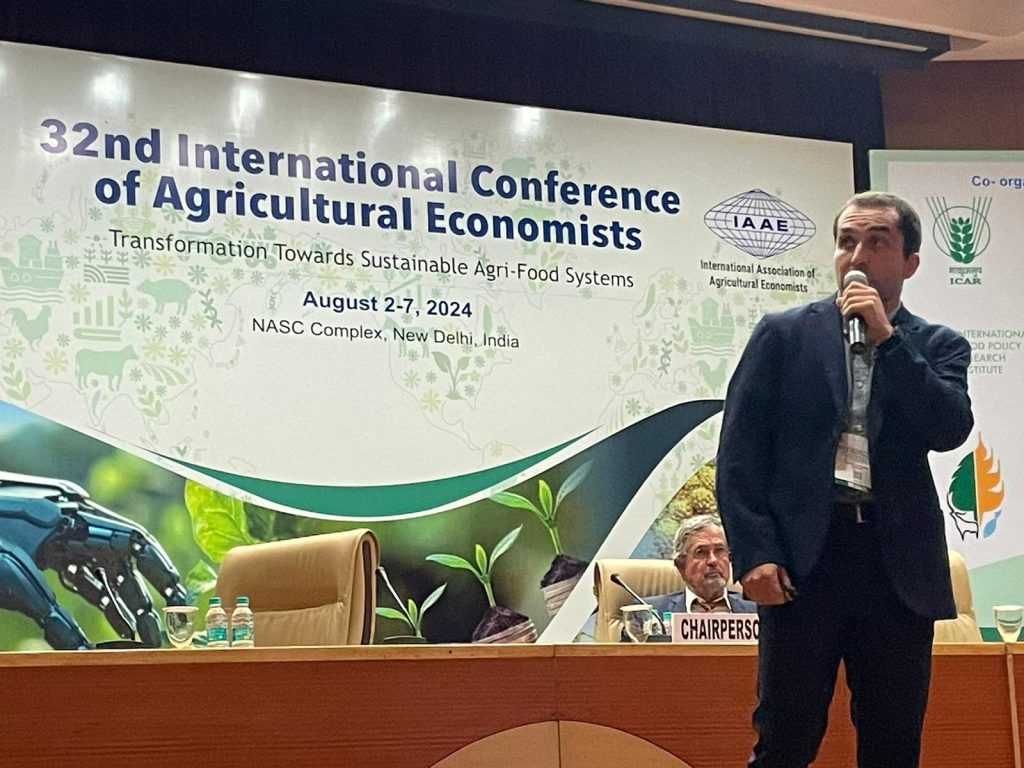Eva Iglesias, Enrique Estefanía and the PRISMA Project Team members are participating in the 32nd International Conference of Agricultural Economics: ‘Transformation towards sustainable agri-food systems’. Organized by the International Association of Agricultural Economists, that is taking part in New Delhi, from August 2 to 7.

On Saturday, Eva Iglesias presented the ‘Adoption of Nature-Based Solutions to improve Climate Change Resilience: The case of invasive Cattail in Nothern Nigeria’, in the Food Security and sustainable agriculture practices symposium. In her presentation, she highlighted the possibility of producing silage from this invasive plant (Typha spp.), reducing its population while increasing resilience to climate change and addressing food insecurity. Their findings reveal that transhuman herders would adopt the technology, and silage could generate a new economic activity that provides new jobs within the existing value chain, but workshops and demonstrations are needed to show the benefits of the technology and to promote acceptance and willingness to pay for this particular kind of silage.

On Sunday, Enrique Estefanía presented a paper entitled: ‘Breaking Boundaries: Using Machine Learning to Improve the Quality of Index Insurance to Protect Small Scale Agriculturalists in the Face of Climate Change’, a novel approach to index insurance schemes, where a Machine Learning based methodology combined with statistical analysis redefines homogeneous areas, instead of following administrative boundaries. This approach was applied to Northern Kenyan grazing lands, and defined homogeneous areas based on high-frequency and high-resolution satellite data. Results show that the quality of the insurance contract can increase more than 100% using the proposed methodology in comparison with the current insurance areas.
Enrique Estefanía also took part in a panel discussion about ‘The Role of Insurance and Financial Innovation in the Small Farm Sector: Where We Are and Where We Need to Go’, where Michael Carter, from the University of California, Davis, was Chairperson. In this panel session, the panellists stated what are the lessons learned about the economic impacts of index insurance and what needs to be done to make index insurance more effective. Three main innovations were presented: the first one relies on new statistical and machine learning methods to design index insurance zones; the second evaluates how individuals make decisions in the face or risk and uncertainty, with a behavioural economic approach; and the third considers how complementary indexed financial tools (indexed savings and lines of credit) can complement index insurance and favour the adoption of improved technologies and practices.

The PRISMA Project team also attended some of the stimulating sessions that were presented at the 32nd International Conference of Agricultural Economics, particularly the presentation by Tesfamicheal Wossen, from the International Institute of Tropical Agriculture (IITA), which was of great interest, since both the geographical location and the objectives of the project coincide with those of PRISMA. In his session, he presented the results of the adoption in Nigeria of the AFLASAFE technology to biologically combat the development of Aflatoxin-producing fungi (aspergillus flavus and aspergillus parasiticus) in maize and other cereals during cultivation.
As the 32nd International Conference of Agricultural Economics is coming to an end, the PRISMA Project continues to advance its objectives of promoting West African food security and sustainable small-scale agriculture with new insights. The recent discussions have highlighted innovative approaches and technologies that could further enhance crop yields, reduce environmental impact, and support local economies. As participants return to their respective countries, the shared knowledge and collaborative efforts fostered at the conference are expected to drive tangible progress in the agricultural practices, aligning with PRISMA’s mission to empower local communities.
